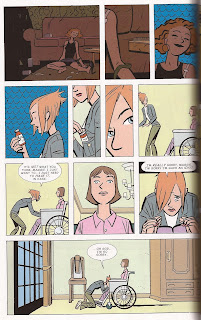When I first heard about The Sons of
Lee Marvin, I thought, “I want in!” When I heard who got it
all rolling, I thought, “I'll stick to Groucho's Club, thanks.”
The
initial Sons of Lee Marvin? Jim Jarmusch and Tom
Waits.
A couple of cool hep-cats. Likeable. Enviable. Admirable,
even. But as much as I like, envy and admire those guys, even I have
to admit their respective acts have occasionally tipped into
something a wee bit indulgent. Pretentious. Fey. Precious, even — e.g., calling
yourselves The Sons Of Lee Marvin, or more recently, The Bastard Sons Of Lee Marvin.
“Fey” and
“precious” should be avoided by anyone claiming lineage to Marvin
(blame your mother and you've really blown it). But
“pretentious” isn't so bad. After all, Marvin was an actor,
someone paid to pretend. Also, “pretenders to the throne” may
have their deficiencies of character, but a lack of ambition isn't
among them. If you're a slightly odd-looking dude, Marvin's throne is
a fine one to pretend to.
The Boss's Bastards
are a different breed altogether. These are the kids who listened to
Darkness At The Edge Of
Town and
Born To Run
and thought, “Yes. Yes!
I
can do this!”
 |
| "Le patron est mon père!" |
They've got the throne in their sights. And, brother, they've got ambition.
I'm
talking about grizzled vets like Mike
Cooley, Patterson Hood and
Jason Isbell,
blue-collar sprats who scraped together enough for a kit and a van,
called themselves the Drive-By
Truckers then
hammered themselves into public consciousness one rowdy juke-joint at
a time.
If you want some idea of what that sounded like, Alabama
Ass-Whuppin',
their first live album (and my second-favourite DBT disc), has been
re-mastered and re-released, here.
I'm
also talking about younger acts, like
The Hold Steady,
Arcade Fire
and The National,
who caught the Boss's gene for earnest self-expression and spliced
that into brooding contemplations of suburban ennui. And I'm talking
about Okkervil
River,
whose latest, The Silver Gymnasium, (here) is all of that, plus
— plus “irreverent” and “catchy as hell” and “fun” —
and might well qualify as my favourite disc of the late-summer.
And
I'm even talking about Low
Cut Connie,
who, at first listen reminded me mostly of early They Might Be Giants
— though where the Giants came across as dweebs cracking wise
between recess beatings, Connie came across as jokers whose next
laugh was likely to come from delivering a few bruises of their own.
But, like The Boss, Connie demonstrates just how far a tankful of
attitude can take you in a crowded room of noisy drunks. In 1986 the
Boss may have allowed Tipper Gore the last (non) word when he
self-censored his live Mission Statement during “Raise Your Hand”
(quote- “You think this is a free ride? You wanna play, you got ta
pay! Now I wanna see you get up. And I want you to walk over to your
radio, turn the mother [silence]
as loud as she'll go, open up the windows, wake up the neighbours,
'cos if there's something you need, if there's something you want,
you've gotta raise your . . .” etc. -end-quote) but Connie
gleefully reclaims the prerogative. They also get the last word on
fun: I bought Call
Me Sylvia (here) back in January; nine months later it's proven itself the perfect soundtrack for the
early evening hours of a Friday night, when a fellow wants the
weekend to proceed on the right note.
But
if you find your particular weltschmerz
is
best echoed in blue-collar anxiety, drama and miscreant tendencies,
you'll want to hew closer to the Boss's country leanings. I refer you then to Eric Strickland
& The B Sides. With their song-writing, Strickland and company have clearly
graduated with honours from the George Jones School of Country, where
strong drink is responsible for the bulk of one's errors in
judgement, if also the bulk of one's succour. That sort of material
is a natural fit on my playlists: this summer Eric's I'm
Bad For You (here) formed a welcome “b side” to Wayne Hancock's Ride.
















